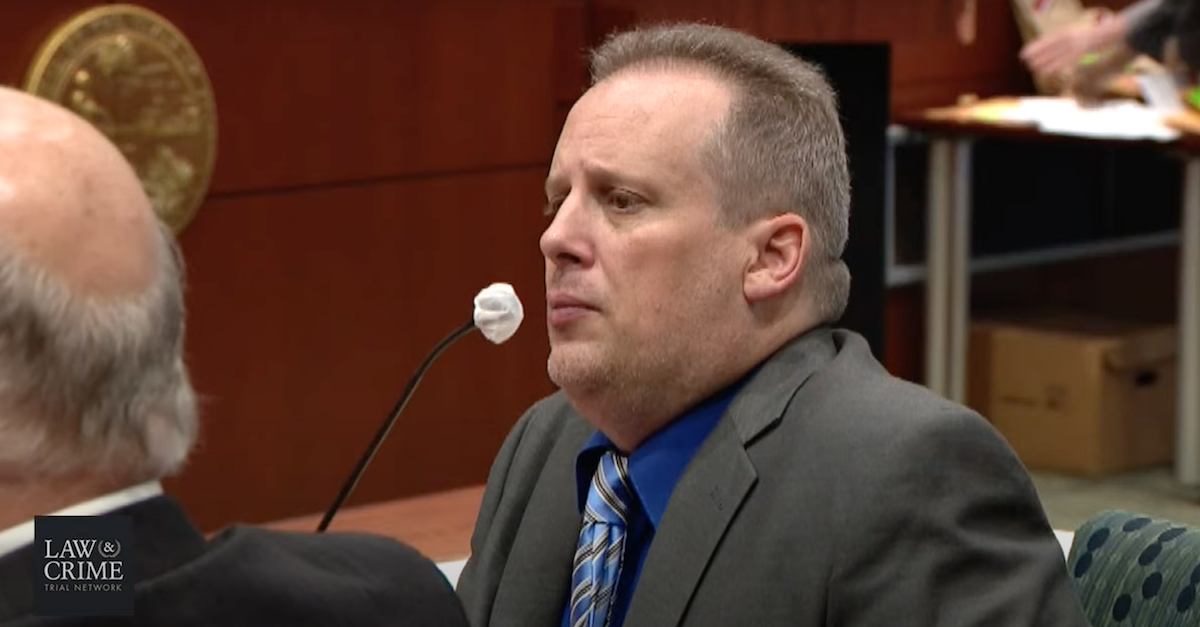
Anthony Todt listens to closing arguments in his quadruple murder trial on Thurs., April 14, 2022.
A former physical therapist has been convicted by a Florida jury of murdering his wife and three children between Dec. 14 and Dec. 18, 2019 — but the defendant, prior to an immediate sentencing proceeding, reasserted his innocence in a speech that accomplished nothing in the long run.
A jury unanimously agreed that Anthony Todt, 46, killed his wife Megan, 42, along with his 13-year-old son Alek, his 11-year-old son Tyler, and his 4-year-old daughter Zoe. All four victims were found with rosaries in their hands, a prosecutor said during closing arguments. A family dog was also killed.
The jury convicted the defendant as charged by prosecutors on every single count; no lesser charge was countenanced.
The quadruple killings resulted in the defendant’s arrest on Jan. 13, 2020 on murder and animal cruelty charges. Prosecutors did not seek the death penalty.
“The reason why we’re here today is control,” Assistant State Attorney Danielle Pinnell said during closing arguments. “The defendant wanted control.”
Pinnell told the jury that a sister called law enforcement to ask for a wellbeing check on Dec. 29, prosecutors asserted. The defendant had previously used the victims’ phones to tell relatives that everyone in his family was sick around the holidays. Eventually, the alleged excuses “did not sit right” with the sister, Pinnell said.
The sister called law enforcement, and the local constabulary found the victims at their home.
“Law enforcement opened the door,” the prosecutor said, “and that’s when they discovered everything.”
The defendant remained “deceptive,” the prosecutor asserted.
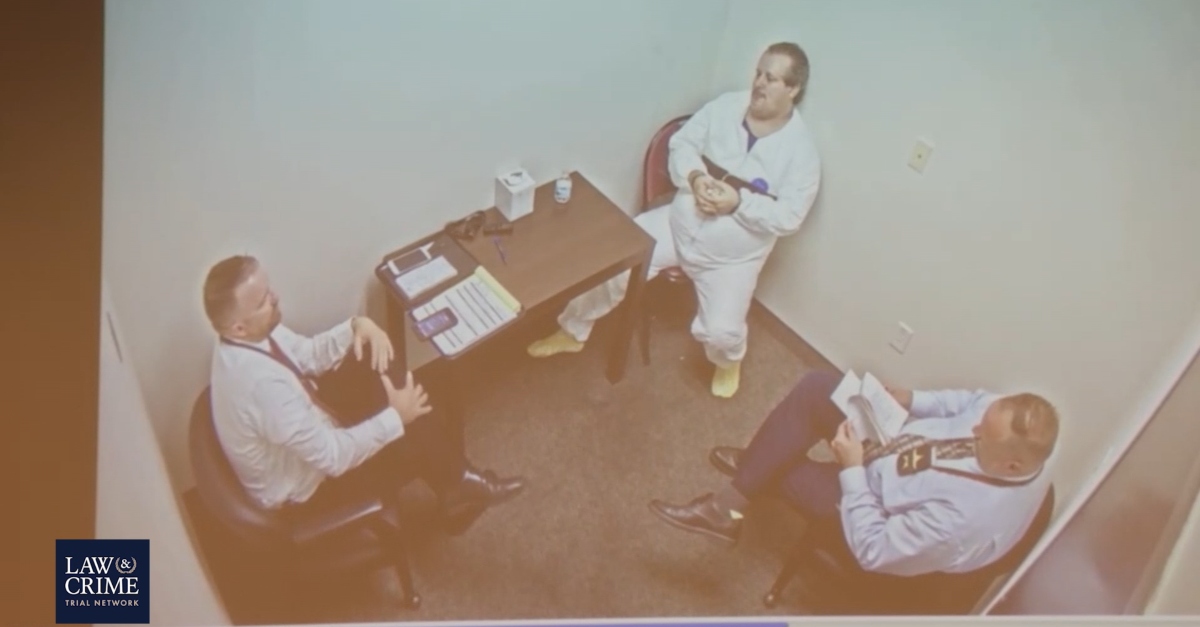
Todt allegedly told a detective that “based upon their beliefs, they bring their children into this world, they should just decide when they leave.”
“The defendant wanted control,” the prosecutor reasserted — control over the lives of his three kids and of his wife.
The defendant at one point blamed his wife Megan for the killings. He claimed she killed the children by feeding them a poisoned dessert, murdered all three while they slept, and then killed herself.
Defense attorney Alesha Smith said during closing arguments that there were “holes,” “gaps,” and “reasonable doubt” in the state’s case.
Among the issues, Smith said, were that some of the autopsy results could not “rule out or give you the true cause of death,” including whether smothering or strangulation occurred — in part because the remains were decomposed.
Tyler, Megan, and Alek died by “homicidal violence by unspecified means,” Smith said; the active drug in Benadryl was also in their systems. Megan also suffered from stab wounds. Zoe, Alek, and Tyler’s bodies showed evidence of “postmortem” stab wounds. But Megan, the wife and mother, had two wounds, each about eight inches deep, which were inflicted while Megan was still alive — and Megan also had some alcohol in her system.
The defense asserted that the findings suggested Megan could have been the killer.
“The evidence, the proof, and the testimony presented here throughout the course of the trial has not proven beyond a reasonable doubt that Mr. Todt was the one that did these things,” Smith asserted. “His testimony is that Megan did it all . . . he came home to his kids being dead, his wife was alive but essentially dying — stabbed herself in front of him and everything.”
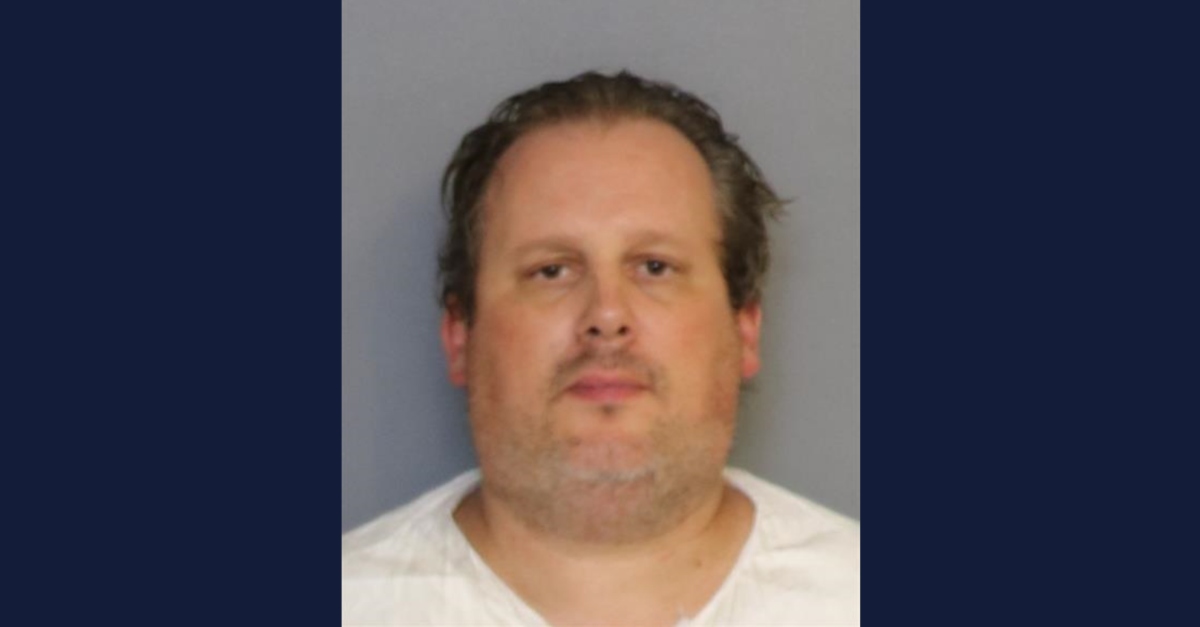
Anthony Todt’s Osceola County Jail mugshot.
Pinnell rebutted those arguments by pointing to the timeline.
“The defendant had been in the house for over three weeks as they slowly decomposed while he was there,” the prosecutor asserted.
The decomposition is what “prevented” the medical examiner from answering the specific questions the defense brought up, Pinnell said.
The prosecution said the defendant admitted he’d been planning the killings since “before Halloween.”
“I did it — just get this over with,” Pinnell recalled the defendant saying to the authorities. She referred to him as a willing confessor who wanted to make sure the police knew exactly what he had done.
“There is no reasonable doubt in this case,” Pinnell said at the conclusion of her arguments.
During pretrial proceedings, the defense also sought to jettison the fruits of a hospital interrogation by arguing that it occurred before the authorities fully informed Todt of his Miranda rights. Two subsequent interrogations also occurred, and Todt repeatedly confessed, according to reports about the trial by the Law&Crime Network. The judge rejected arguments that the interrogations should be tossed despite defense claims that Todt was suicidal and had overdosed on Benadryl; the judge reportedly ruled that the interrogations were voluntary.
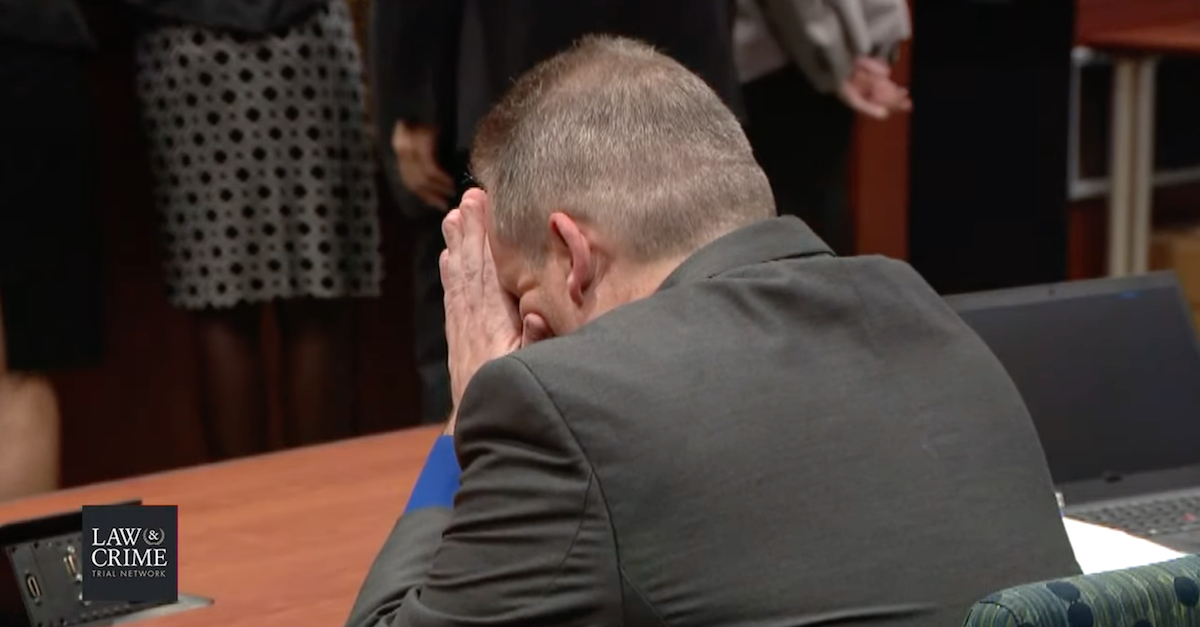
Anthony Todt holds his head in his hands while attorneys confer with a judge about a partially deadlocked jury on Thurs., April 14, 2022.
Around 5:45 p.m. local time on Thurs., April 14, the jury announced that it was deadlocked on some of the counts but had apparently reached a verdict on some of the others. The judge initially asked the jury to fill out verdict forms as to the counts which resulted in a verdict or verdicts and indicated he would receive those forms in a sealed envelope. After conferring with counsel, he said he would allow the jury to keep the forms and would read an Allen charge to encourage the jury to continue its deliberations.
At about 6:50 p.m., the judge announced that a verdict had been reached.
As the first guilty verdict was read, Todt appeared to lightly sob; he then began to shake his head “no” as the remaining verdicts came in — and he continued to do so for quite some time thereafter. Todt even continued to shake his head as the judge adjudicated him guilty.
The defense declined to seek a pre-sentence report given the mandatory penalties for the crimes of which the defendant was convicted.
After about a fifteen-minute break, the judge proceeded to sentencing. An aunt to Megan Todt said Megan had “lots of empathy for everyone” and a “giving heart.” Megan was the sort of person to make soup for ill neighbors, the aunt said.
She added that the children traveled to convalescent homes to play recitals for informed residents around the holidays. Alek wanted to learn the violin, and Tyler wanted to play the folk guitar, the aunt told the court.
Children in the neighborhood started asking their fathers if they, too, would kill them, the aunt said while trying to explain the ripple effects of the murders on the community. She called the ordeal a two-and-a-half-year “nightmare,” a “horrific tragedy,” and said the whole family was “crushed” and “mortified” by the deaths.
The aunt said the defendant would incessantly call both his wife’s phone and her phone when she and Megan were having a girl’s day out. She said the defendant’s acts added up to harassment.
The defendant then asked to speak.
“This was a personal catastrophe in everybody’s life in my family, including myself,” the defendant said. “I maintain my innocence.”
“I provided for my wife, did everything I could for my wife,” the defendant said. “She was progressively sick over the years. There were days which were worse, days which were better. She was kept on a pedestal from me. My kids kept — I did everything for them.”
The defendant said he gained significant weight because he “negated” himself and got only “two to three hours of sleep a night” because he was “treating” his wife.
“I appreciated her medical concerns, and the reason I would call so much is because Megan would have bad days,” he said with reference to the telephone calls referenced by the aunt.
“I love my wife; I love my children,” the defendant continued. “I was not there the night my children died.”
The defendant said the Friday before the deaths, his wife screamed at his son because the son didn’t clean a pot the way she would have preferred. He said his wife’s “anger issues” were frequently directed at him.
Todt said he told his wife she needed to see a doctor or else he would start securing treatment. He said his wife hid whatever illness he complained of — and her alleged tantrums — from the public.
“She knew I didn’t believe this light and this other religion that she went into,” Todt continued. “But I supported her, because that’s what a husband does. Everybody has a freedom to choose their own religions. Everybody has a freedom to choose their own acts.”
The defendant claimed his wife fell asleep and that he went downstairs before being interrupted by his attorney.
The attorney said the judge didn’t have the “authority to overturn” the verdict.
Todt said he needed to let the judge know what happened, from his perspective.
He said an “altar” that was frequently discussed in connection to his case was actually homeschooling project about Egypt. He also claimed to have trouble starting a car.
He concluded by affirming his love for his wife and children.
“I did not do this,” Todt repeated.
He also indicated that he “didn’t remember” anything that happened between when he claimed to have fallen down a set of stairs and when he realized he was in jail.
The judge then said the defendant was a “destroyer of worlds” — and that a jury unanimously determined that Todt murdered four people with premeditation.
The judge sentenced Todt to life in prison without the possibility of parole — four life sentences for four separate murders. The sentences were ordered to be served consecutively. The judge also ordered a year of incarceration for killing the dog.
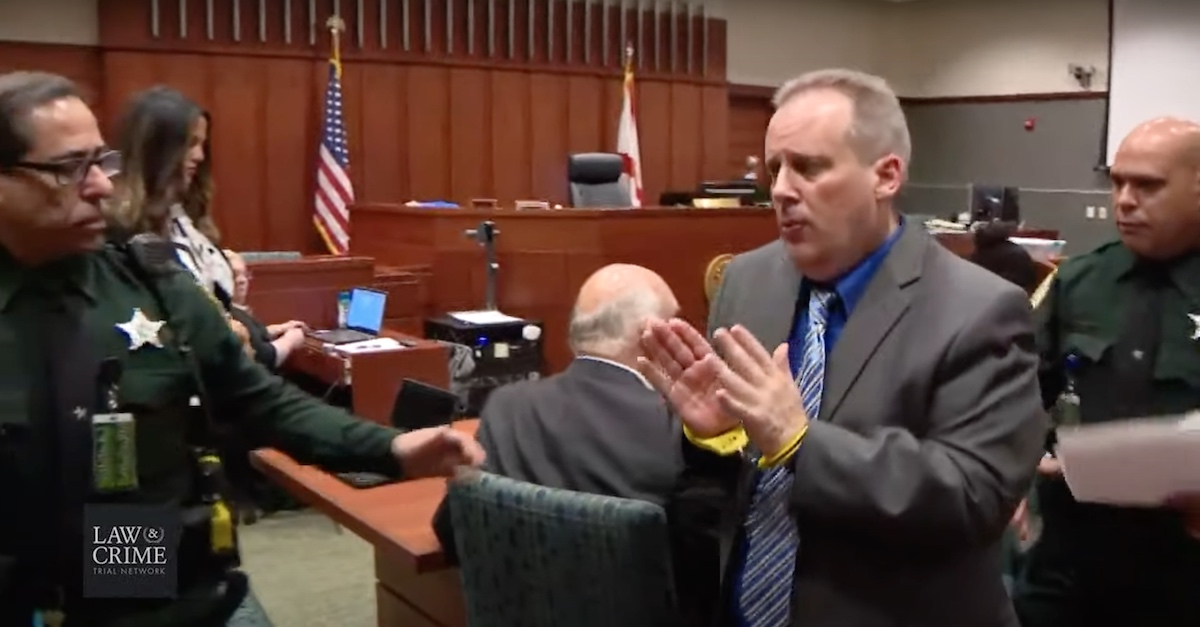
Anthony Todt was led from the courtroom after being sentenced to four back-to-back life sentences, plus an additional year behind bars.
[Image via screengrab from the Law&Crime Network, except as noted.]